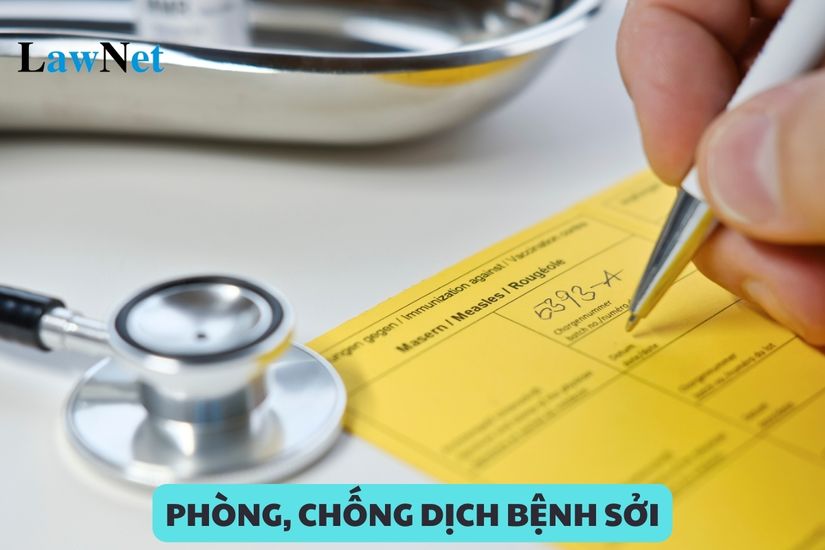Ho Chi Minh City Department of Education and Training Urgently Implements Measles Prevention and Control in Educational Institutions
Ho Chi Minh City Department of Education and Training Urgently Implements Measles Prevention and Control in Educational Institutions
On August 29, 2024, the Ho Chi Minh City Department of Education and Training issued Official Dispatch 5402/SGDDT-CTTT in 2024 (download here) to enhance measles prevention and control in educational institutions.
To prevent and control measles in educational institutions, the Ho Chi Minh City Department of Education and Training directs as follows:
For Educational Institutions:
- Continue to implement infectious disease prevention measures in schools according to the guidance documents provided by the education sector.
- Closely coordinate with ward, commune, and commune-level town health stations in conducting infectious disease prevention activities in schools, particularly focusing on early detection of cases in childcare groups and kindergartens.
- Immediately inform ward, commune, and commune-level town health stations when a case is detected.
- Childcare centers, kindergartens, and schools where many children gather must maintain cleanliness, ensure ventilation, and regularly disinfect toys, educational tools, and classrooms with common disinfectants.
For Parents:
- Proactively take children aged from 9 months to 2 years, who have not been vaccinated or were incompletely vaccinated, to receive the full and timely measles vaccines.
- Avoid letting children come near or contact children suspected of having measles; frequently wash hands with soap when caring for children.
- Maintain daily personal hygiene, including the nose, throat, eyes, and oral hygiene for children. Ensure the living environment and toilets are clean and well-ventilated. Enhance nutrition for children.
- When signs of fever, cough, runny nose, and rash are detected, isolate the child promptly and take them to the nearest medical facility for examination, counseling, and prompt treatment. Avoid unnecessary referral to higher-tier hospitals to prevent overloading and cross-infection.
See detailed instructions at Official Dispatch 5402/SGDDT-CTTT in 2024 (download here)

Ho Chi Minh City Department of Education and Training Urgently Implements Measles Prevention and Control in Educational Institutions (Image from the Internet)
What are conditions for school health staff in Vietnam?
Pursuant to Clause 2, Article 8 of Joint Circular 13/2016/TTLT-BYT-BGDDT:
Ensure the conditions for medical rooms and school health staff
...
- School Health Staff
a) School health staff must have professional qualifications of at least intermediate-level health practitioners. Based on local actual conditions, schools may arrange for school health workers who meet this requirement or contract with ward/commune health stations or medical facilities of polyclinic-level or above to take care of students' health;
b) School health staffmust regularly update their health professional knowledge through seminars, training, professional skill enhancement organized by the health and education sectors to perform their duties as regulated;
c) School health staff are assigned tasks, organize, and implement regulations in Articles 9 and 10 and other tasks as assigned by the school leadership.
Thus, school health staff must meet the following conditions:
- Must have professional qualifications of at least intermediate-level health practitioners.
- Must regularly update health professional knowledge through seminars, training, professional skill enhancement organized by the health and education sectors to perform their duties as regulated.
What are regulations on organization of activities to manage, protect, and take care of students' health in Vietnam?
According to Article 9 of Joint Circular 13/2016/TTLT-BYT-BGDDT, schools need to implement activities to manage, protect, and take care of students' health as follows:
- Conduct health checks at the beginning of the school year to assess nutritional status and health: measure height and weight for children under 36 months old; measure height, weight, blood pressure, heart rate, and vision for students aged 36 months and above.
- Measure height and weight, record growth charts, and monitor physical development for children under 24 months monthly and for children aged 24 months to 6 years quarterly; monitor body mass index (BMI) at least twice a school year to provide advice on proper nutrition and physical activity for students.
- Regularly monitor students' health to detect vision impairment, spinal curvature, oral health issues, mental health disorders, and other diseases for treatment or referral to medical facilities as per regulations and apply suitable learning and training policies.
- Cooperate with qualified medical facilities to organize specialized medical examinations and treatment for students.
- Provide first aid and emergency care according to the current regulations of the Ministry of Health.
- Advise students, teachers, parents, or guardians on health-related issues, physical and mental development; guide students on self-care; in cases with disabled students, provide counseling and support for integration.
- Guide the organization of school meals ensuring reasonable nutrition, diverse food, suitable for different subjects and ages, especially in boarding and semi-boarding schools.
- Coordinate with local medical facilities to organize vaccination campaigns for disease prevention for students.
- Periodically inform at least once a school year and as needed about students' health status to parents or guardians. School health workers evaluate students' health status at the end of each educational level to serve as a basis for health tracking in the subsequent level.
- Maintain and record in health examination books, student health monitoring books, and comprehensive health status monitoring records.
- Regularly inspect and supervise learning conditions, classroom hygiene, food safety, provision of drinking water, handwashing soap. Proactively implement hygiene measures and preventive policies as regulated.
- Implement health programs, hygiene movements for disease prevention, promote physical activities, reasonable nutrition, and build a smoke-free, alcohol-free, and substance abuse-free environment.

